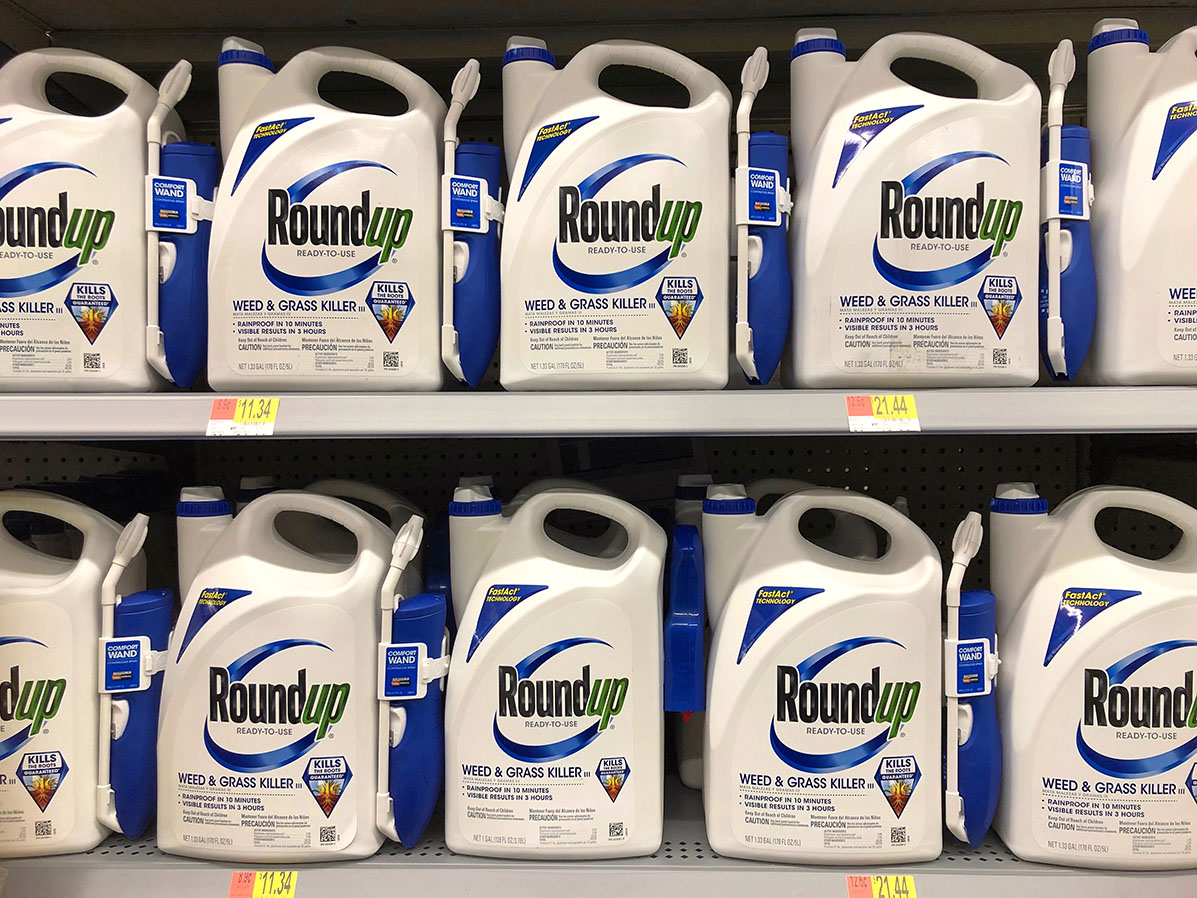Since Roundup was discovered to contain harmful carcinogens, numerous Roundup cancer lawsuits have been filed against its manufacturer, Monsanto, which is now owned by Bayer. In May 2022, the company reached an $11 billion settlement, which accounted for around 80% of the 96,000 lawsuits levied against the product at that time.
In June 2022, the company was declined an appeal when Alberta and Alva Pilliod won $87 million in a settlement after developing cancer due to the weedkiller. The next scheduled cases against the company include those of Langford and Pied in November 2022 as well as Griswold and Freiwald in January of next year.
As more research releases, more Roundup cases are filed every day. Continue reading this Roundup settlement update to learn more about the product’s dangers and the steps you can take if you believe you have a case.
The History of Roundup
Roundup is a brand name for an herbicide introduced by Monsanto in 1976. It was created as a broad-spectrum weed killer. Under regulated conditions, the pesticide was labeled as safe to use.
However, in 2015, the International Agency for Research on Cancer (IARC) reclassified Roundup and its main ingredient, glyphosate, as a probable carcinogen. This led to numerous lawsuits against Monsanto for failing to warn consumers about the compound’s potential dangers.
As a result of financial pressures from numerous Roundup settlements, Monsanto went defunct in 2018 and was purchased by Bayer, the German biotechnology company. Bayer is the entity that now pays damages settled in lawsuits for ex-Monsanto products.
What is Glyphosate?
Glyphosate is the main ingredient in Roundup. Monsanto developed and patented the compound in the 1970s as a non-selective herbicide. It was most commonly deployed on soy, corn, and cotton crops.
Glyphosate was evaluated by the European Food Safety Authority and German Federal Institute for Risk Assessment in 2013-2015 and found to be within safety guidelines. However, jury cases involving glyphosate-based products have focused not only on how dangerous the compound is but on how negligent its manufacturers have been in adequately informing consumers of its potential harm.
Since the IARC ruled on glyphosate’s potential for causing cancer, many conflicting studies have been conducted on the scope of its adverse effects. The science on glyphosate toxicity is ongoing.
Roundup Cancer Lawsuits
After the IARC’s study, hundreds of plaintiffs filed cases against Monsanto. The most notable was Dewayne Johnson, a groundskeeper who had used Monsanto products for decades.
The jury awarded Johnson $289 million in damages as a result of his non-Hodgkin’s lymphoma diagnosis, though this amount was cut considerably to $21 million after a series of appeals.
In the wake of Johnson’s case, over 100,000 cases against Roundup have been settled, with over 30,000 still pending. Most involve claims of false advertising resulting in personal injury.
In June 2022, the Ninth Circuit court asked the Environmental Protection Agency to re-evaluate its stance on Roundup, leading to studies about the risks of cancer from glyphosate and its related products being published on an ongoing basis.
Roundup Lawsuit Claims
Roundup lawsuits cannot always definitively prove that a consumer’s cancer was caused by Roundup. Instead, plaintiffs like Johnson often argue that Monsanto inadequately warned its consumers about the product’s potential as a carcinogen in their advertising, leading to bodily and emotional harm.
Importantly, Bayer has not lost all Roundup-related cases. A child in California, for instance, was not awarded a settlement due to having insufficient contact with Roundup to cause their lymphoma.
As of now, the EPA maintains that Roundup does not cause cancer. However, a University of Washington study corroborated the IARC’s findings that being exposed to glyphosate-based herbicides considerably raises a consumer’s risk for non-Hodgkin’s lymphoma. Additionally, a July 2022 study in JCEM demonstrated a link between glyphosate and thyroid cancer.
Any Roundup cases in the future will likely cite these studies as evidence in their defense when presenting a plaintiff with a cancer diagnosis and confirmed exposure to glyphosate.
Can You Sue Your Employer If You Used Roundup at Work?
Using Roundup as part of a job could be a basis for a Roundup court case in the presence of a diagnosis. However, this is not a guarantee. The case may be more successful when levied against the employer rather than Bayer itself.
For example, employers are obligated to provide employees exposed to herbicides with safety equipment such as face masks and gloves. Failing to provide these could be the basis for a successful suit against them based on employer liability laws.
A lawsuit against an employer could happen in tandem with one against Bayer. However, you cannot win two settlements for the same claim. Workers’ compensation claims are filed separately and may impact your ability to pursue further damages against the company.
What is the Average Payout for a Roundup Lawsuit?
Roundup lawsuits have resulted in up to $2 billion in a single settlement. However, the average payout is closer to $5,000-$250,000. The amount depends on many factors, including the damages sustained, the victim’s exposure to the product, the relevant diagnosis, and the proof of the company’s negligence.
The results of over 100,000 lawsuits against Monsanto/Bayer have resulted in $10 billion in damages paid to victims of glyphosate.
Who Can File a Roundup Lawsuit?
Importantly, using Roundup is not enough to file a suit against the company since millions of people have used the product with no adverse effects. Courts require proof of a relevant injury to review a case, which includes detailed health records that can be corroborated with the use of Bayer’s products.
This means that anyone who plans on filing a lawsuit must be prepared to share and discuss their medical details and personal histories with the discovery. They must also be aware of the statute of limitations in a product liability case, which varies between states but is usually around 2-4 years in most places.
After that time, consumers will no longer be able to file a personal injury lawsuit. Importantly, the time begins counting when you receive a cancer diagnosis or, alternatively, when the connection between the herbicide and its potential to cause cancer was reasonably known to you.
How to File a Roundup Lawsuit?
If you develop non-Hodgkin’s lymphoma after using Roundup, you may have a suit against Bayer. However, in addition to the statute of limitations, which differs between states, you also need to be aware of certain steps so you can receive a Roundup settlement successfully.
Since you are the plaintiff in the case, the burden of proof is on your side to demonstrate that exposure to Roundup was the direct cause of your cancer diagnosis. Since a product is involved, the case will fall under product liability law, which is the same that punishes a company for selling a defective product.
This means that even if the company demonstrates that they showed reasonable care in the manufacturing and distribution of the product, consumers who were hurt by the product can still make a case. To win the case, however, you need certain documents on your side.
The most important is the medical evidence that proves that the use of the herbicide led to your condition. This is the main sticking point of most Roundup court cases because of the time it takes for a cancer diagnosis to develop. The defendant (the company) will try its best to prove that the cancer was caused by something else.
The next thing you need in order to file a Roundup lawsuit is documentation that shows the damages you sustained from your injuries. These damages include not only medical expenses for your cancer like tests and treatment but also the wages that you missed for leaving work as well as other costs. In some cases, even emotional damages can be cited, provided that some evidence of them has been documented.
All these claims require the relevant documents to prove them, which could include:
- Employment records verifying your job, which could relate to the regular use of Roundup
- Medical documents such as test results and notes from your doctor demonstrating that you have a debilitating medical condition
- Healthcare expense records like medical bills, including the costs of tests and medications
- Pay stubs showing that you have lost work as a direct result of your medical condition
Importantly, you may also need the receipts that prove that you purchased Roundup so that your legal team can affirm to the court that you came in contact with the product. A bank statement may be enough to prove this as well.
You may not need these receipts if, for example, you came in contact with the product through your work and never had to directly buy Roundup yourself. Otherwise, they would be an important step in filing a successful case.
All these documents are exchanged during the discovery phase of the case, which is the lengthiest part, sometimes taking a year to settle all the records and information. In many states, the “discovery rule” exists to extend the statute of limitations for a case pending the discovery phase of the suit.
You may be able to settle with the company after the discovery phase. Otherwise, the case will go to trial or be dismissed. In the case of a trial, you will need to wait even longer and follow the advice of your attorney throughout the process.
Remember that even if the jury rules in your favor, Bayer can still file an appeal, which will extend the process even further.
Summary
The herbicide, Roundup, has become the center of conflict for a multi-billion-dollar series of lawsuits. The plaintiffs allege that the manufacturer, Monsanto (now Bayer) falsely advertised the weedkiller and failed to inform consumers about its potential to cause cancer.
Despite thousands of cases won for consumers, totaling over $10 billion in settlements, the evidence is still conflicted on whether Roundup and other glyphosate-based herbicides cause non-Hodgkin’s lymphoma and other cancers. However, studies continue to be done that demonstrate the connection.
Filing a successful Roundup lawsuit requires precise documentation involving the purchasing of Roundup, the medical problems it caused, and the resulting damages, both financial and emotional.
As more cases go to trial, the spotlight on Roundup continues to brighten. Contact a personal injury lawyer to learn more about how you may have a case against Bayer for an illness that you sustained from using Roundup or other glyphosate-containing products.

Rocky Horton
Author
Rocky Horton is a health and safety expert from Chapel Hill, NC. He is the founder of AccidentAdvisor and has been featured in Forbes, Bloomberg, and other publications. Learn more.













